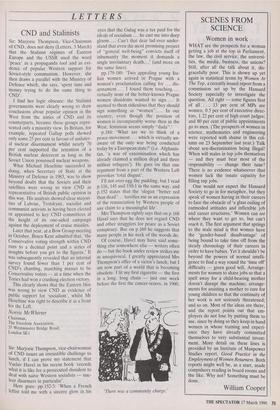SCENES FROM SCIENCE
Women in work
WHAT are the prospects for a woman getting a job at the top in Parliament, the law, the civil service, the universi- ties, the media, business, the unions? Still, after all the talk about it, dis- gracefully poor. This is shown up yet again in statistical terms by Women At The Top, a recently issued report from a commission set up by the Hansard Society especially to investigate the question. All right — some figures first of all . . . 13 per cent of MPs are women, 0.5 per cent of executive direc- tors, 1.22 per cent of high court judges; and 80 per cent of public appointments go to men. (The prospects of women in science, mathematics and engineering were reported with shame in this col- umn on 23 September last year.) Talk about sex-discrimination being illegal! When will males in top jobs themselves — and they must bear most of the responsibility — change their tune? There is no evidence whatsoever that women lack the innate capacity for filling top jobs.
One would not expect the Hansard Society to go in for metaphor, but they speak of women having in their careers to face the obstacle of 'a glass ceiling of outmoded attitudes and inflexible job and career structures.' Women can see where they want to get to, but can't reach it. The first argument that springs to the male mind is that women have the 'gender-based disadvantage' of being bound to take time off from the steady chronology of their careers in order to have babies. Yet it shouldn't be beyond the powers of normal intelli- gence to find a way round the 'time off difficulty — given good will. Arrange- ments for women to share jobs so that a spell away for a child-bearing mother doesn't disrupt the machine; arrange- ments for assisting a mother to care for young children so that the continuity of her work is not seriously threatened; and so on. Most of the ideas are there, and the report points out that em- ployers do not lose by putting them to use, since by doing so they keep in hand women in whose training and experi- ence they have already committed themselves to very substantial invest- ment. More detail on these lines is provided by an Institute of Manpower Studies report, Good Practice in the Employment of Women Returners. Both reports might well be, as a start, made compulsory reading in board rooms and the like. Why not? Something must be done.
William Cooper


























































 Previous page
Previous page